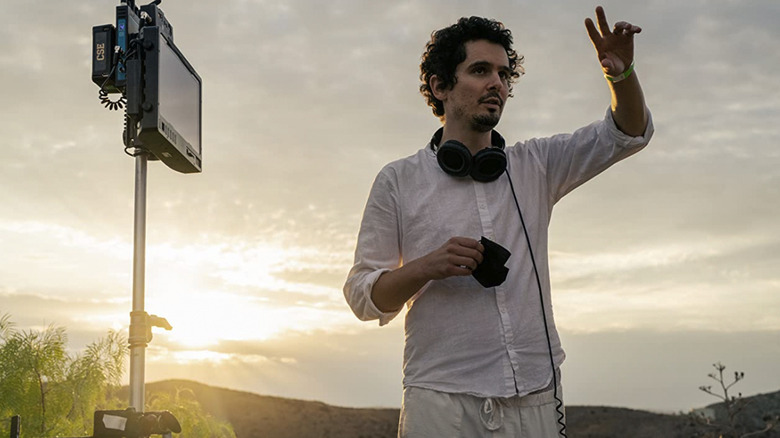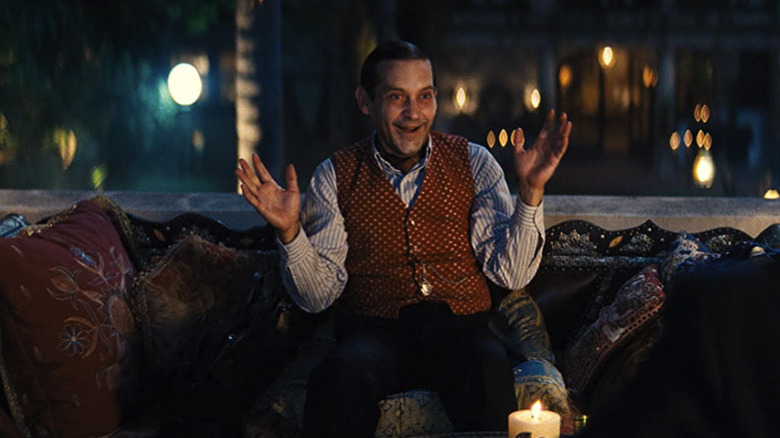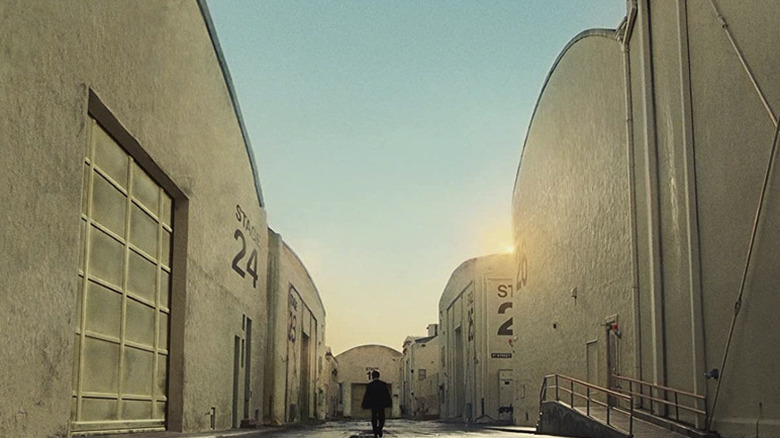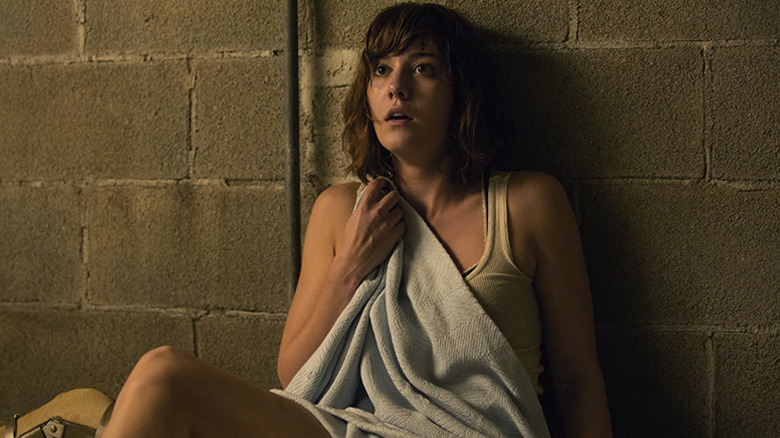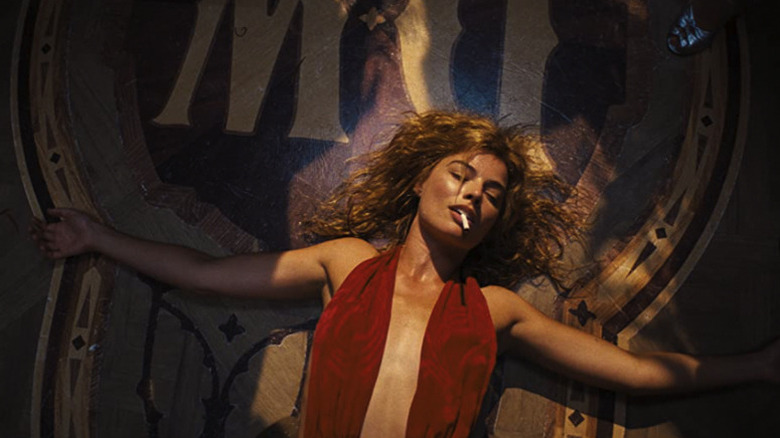Damien Chazelle On Babylon's Descent Into Hell And Getting His Start In Hollywood [Exclusive Interview]
Damien Chazelle's raucous, sprawling Hollywood epic "Babylon" may not have performed as well at the box office as everyone hoped, but it's the type of film you can't help but admire for the way it fully commits to its approach and tries to give audiences the most bombastic, energetic possible version of its story. I loved the movie — so much that even though I spoke with the writer/director for the movie's initial release, I leapt at the chance to talk with him again in support of its impending home entertainment release. (It's currently available on Digital.) This is undoubtedly a divisive movie, but the "Babylon" hive is strong, and I consider myself an enthusiastic member.
In this discussion with Chazelle, we spoke about filming that nightmarish Tobey Maguire sequence, his early days in Hollywood writing genre films, avoiding shooting coverage, and more.
Note: This interview has been lightly edited for clarity and brevity.
'Oh, f***. We're actually doing this'
In a movie with a dozen standout scenes, the descent into hell with Tobey Maguire's character is pretty high up there for me. What do you remember about shooting that section of the movie? Because it seems pretty wild.
We shot it towards the end of the shoot, so everyone was a little tired and loopy and borderline delirious by that point. And I remember one of the producers, Matt Plouffe, we were doing some interview a month ago, and I hadn't really heard this from him before, but he was commenting that because of the nature of it and because it was tagged at the very tail end of our shoot, there was a little bit of — at least among, I don't know if it was the crew or maybe people at the studio — this question as to whether we were ever actually going to shoot this. [There was] an assumption that it probably wouldn't actually happen.
So I think there was a little bit of, "Oh, f***. We're actually doing this," when everyone wound up assembled on — we shot the interior on a sound stage, but assembled on a sound stage with an alligator and rats and a host of people dressed up in variety of things. And it was like, "Okay, we're actually doing this."
I love the way that you create a sense of energy in your filmmaking. There's lots of push-ins and quick edits and insert shots. Do you shoot all of those insert shots yourself, or do you sort of farm that out to a second unit?
Most of them are, in the case of this movie, storyboarded and sometimes put together in animatics or things like that that I'll do with the music so I know exactly how to use them. Then we'll do it where any of them that [director of photography] Linus [Sandgren] and I can get as we're shooting the scene that they belong to, we will. Those that we don't get, it becomes a little bit of a to-do list.
For the past few movies now, we've worked with this cinematographer, Davon Slininger. He'll sometimes work alongside Linus, operating the second camera if we're doing two cameras. Otherwise, if it's just single camera and it's just Linus and me, then he'll be the one who winds up shooting. Sometimes he'll be set off in a corner, and I'll ping pong between and be with him when I can and be with Linus when I can.
So it's the sort of thing where we have the ability to multi-unit it. But it's all still basically one unit, because it's all ultimately under Linus and under me. And Davon and I, we've been shooting together for so long now that it's the same as me and Linus. So it's a way of keeping it efficient, which you have to, but keeping it all under one roof. Because I would be a little nervous about doing the total farm-out thing.
'What the f*** are you shooting?'
I heard Tony Kushner mention that "The Fabelmans" was filming on the Paramount lot at the same time as "Babylon." And I was wondering if that was something that you're ever aware of when you're making movies. Obviously, you have to be insanely busy on your own set. But I was wondering if you ever had a situation where you had some downtime between takes to sneak away and watch some other filmmaker at work nearby.
Well, I've never done that in terms of actually just going and hanging out on another set. But I've definitely had the run-ins that are really nice. It makes you think of what it must have been back in the days when tons of stuff was shooting on a given studio lot and directors would be running into each other and whatnot.
But running into Steven [Spielberg] on the Paramount lot ... I remember a little bit later, when we were doing the blockhouse [scene in "Babylon"], I ran into Miles Teller who, at that point, it had been years since I'd seen him, actually. He was shooting the show "The Offer," they were shooting part of that on the Paramount lot. And I remember standing and catching up with him. And we're catching up, and he's seeing the extras walk by me who had been cast for the blockhouse all filing in. And he had no idea what I was shooting, but I just remembered seeing his eyes just start gravitating more and more towards this gallery of very interesting-looking characters going in and out of the stage that I was coming from. And eventually he just had to — he's like, "What the f*** are you shooting?" [laughs]
That's great. I know "Babylon" was something that you've been slowly working on for years until you finally got the opportunity to get it made. Is there another project that you've also been slowly toiling away at for a long time? A dream project that you're hoping will see the light of day in the coming years?
No, not really. The short answer is that the proverbial desk drawer or briefcase or whatever you call it of scripts is basically empty now for me. I had what felt the lucky circumstance of always having something in that drawer or that briefcase with previous movies that I could pull out.
Obviously, "Babylon" was germinating for a while. "La La Land" was germinating for a while. So as soon as I did "Whiplash," I knew I would go and do "La La Land." And I was working on "First Man" with Josh Singer while doing "La La Land." So I'm now at what feels like an unusual situation for me of not having the next movie script ready to go, or even knowing exactly what it'll be.
'Why was Blumhouse on Whiplash?'
I wonder if we could go back in time for just a minute and if you could share any stories about your experiences on the movies that you wrote but ultimately didn't direct. I'm thinking of "Grand Piano" and "10 Cloverfield Lane." I think a lot of people might not associate you with those projects.
Yeah. "The Last Exorcism Part II," as well. Which, I don't know why you skip over that, but...
[laughs] I haven't seen that one personally. But I've seen the other two.
Oh, well that's obviously my highest accomplishment, so I would put that top of your list to be really completist. [laughs] No, but joking aside, that's how I got my start in Hollywood, let's say, was as a writer for hire and very much in that sort of space of genre stuff, whether it was doing rewrites — "Cloverfield Lane," really, was a rewrite. So I can't really take much credit there. That was a genre spec script that Bad Robot had, and they had me come on and do a pass on. Then I think another writer did a pass, and Dan Trachtenberg directed the film. So I was one of several writers on that.
In other cases, I'd be pitching on stuff that I wouldn't get, but it would lead to things that I would get. For instance, the people who wound up producing "Whiplash," the folks at Blumhouse, who wound up being ... why was Blumhouse on "Whiplash"? In some ways, that doesn't feel like an obvious connection. Well, that was because I got to know some of the Blumhouse folks by pitching, I think it was "Ouija." I was pitching as a writer on "Ouija," or maybe it was "Paranormal Activity 5" or "6," or one of those. Anyway, didn't get those assignments, but got to know one of the producers at Blumhouse, Cooper Samuelson, and gave him "Whiplash," et cetera, et cetera.
That's very literally how I got my start was doing the work-for-hire writing. Then I'd write stuff on the side that I wanted to direct. The briefcase on the side was the scripts I would write for me, and I'd stuff them there and hope to one day have the clout to be able to direct them.
The one time I got to go on set for a script that I'd written was "Grand Piano." I went to Spain for a couple days while they were shooting that. Eugenio Mira was the director on it. And I've got to say, I learned a ton. I stole a bunch of tricks from him on just — it was great training for me, actually, before shooting "Whiplash" or even "La La Land" because it was all set to music. The music had been pre-composed. Camera moves were timed to the music, and it was a mix of live music and playback. That whole thing. I feel like I just sat there, not even knowing necessarily how I would use what I was learning, but just soaking it up. He was really generous as a director to just let me sit there and learn.
'Coverage. It's such an ugly word'
I have time for one more question. People talk about shooting coverage a lot, but your films always seem so deliberate to me. I know you did a lot of storyboards for this movie. But I'm wondering if the idea of shooting coverage is something that you've had to contend with less and less over the years, or if you still encounter producers or studio executives who might try to force you into shooting angles that you know might not need?
No. I've been lucky that I haven't really had to deal with that.
I remember there was some behind the scenes — it might have been at the studio, I forget — but some grumbling when we were doing "La La Land" of, "Where's the coverage?" That movie especially is really, the language was just oners. We didn't literally stick to this plan, but trying to, with each scene, how can we economically and elegantly do this without cutting? That was always the approach. It was very much an anti-coverage movie, even more than anything else I've done. That was the only time.
But that was still early on, so there was some handwringing. But again, the producers protected me from it, and I never actually had to shoot anything I didn't want to. Yeah. Coverage. It's such an ugly word. Sometimes it's a necessary evil, but it's just the word itself. Doesn't it just feel so uninspiring?
It does.
It's hard to get the team, the actors, and the crew all excited, "Let's shoot some coverage!" You don't use it in a pep talk.
Well, "Babylon" feels like an anti-coverage movie as well. So thanks for making it, and for speaking with me today. I look forward to seeing whatever you generate out of your empty drawer of nothingness next.
Yeah, wish me luck. Thanks, man.
"Babylon" is available on Digital HD now, and comes to 4K/Blu-ray/DVD on March 21, 2023.
